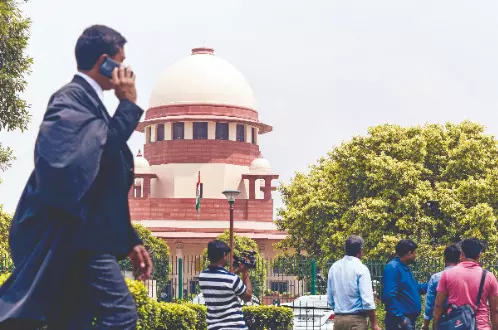Lawyers giving legal advice to clients under probe can’t be summoned: SC

New Delhi: The Supreme Court on Tuesday observed that legal practitioners cannot be summoned by investigative agencies solely for providing legal advice to a client facing inquiry, but such protection will not extend if the lawyer is actively aiding in the commission of a crime.
A bench of Chief Justice B R Gavai and Justice K Vinod Chandran made the remarks while hearing a suo motu case concerning the practice of summoning advocates by agencies for their professional role in representing clients or offering opinions.
“If somebody (a lawyer) is assisting the client in the crime, then he can be summoned… but not merely for giving legal advice,” the bench stated during the proceedings.
The matter was taken up after concerns raised by bar associations over what they termed a growing practice of “arbitrary summoning” of lawyers. Senior advocate Vikas Singh, appearing for the Supreme Court Bar Association (SCBA), cautioned that such actions could have a “chilling effect” on the legal profession.
“If lawyers can be routinely summoned for advising clients, no one will dare to provide counsel in sensitive criminal matters,” Singh said. He suggested a two-step safeguard — requiring approval from a district Superintendent of Police and subsequent clearance by a judicial magistrate before summoning a lawyer.
The court indicated that judicial oversight could serve as a safeguard against investigative excesses.
Solicitor General Tushar Mehta, representing the Enforcement Directorate (ED), agreed that professional advice alone should not attract summons. “The profession itself is protected under the proviso,” Mehta said, while adding that measures should not be crafted in a way that violate the constitutional principle of equality.
He noted that any misuse of authority was addressed swiftly in past cases, citing instances involving senior advocates Arvind Datar and Pratap Venugopal, where actions were withdrawn within hours of complaints. Mehta suggested that before issuing any summons, the ED Director could personally review the matter.
Senior advocate Mukul Rohatgi flagged the issue of in-house counsel being caught in investigations without adequate safeguards. Advocate Sidharth Luthra pointed out that lawyers may not know whether their fees are sourced from illicit funds, while Shoeb Alam mentioned that freezing of law firm accounts without proof undermines professional independence. “Fees received for legal services should be presumed bona fide,” Alam argued.
The Supreme Court Advocates-on-Record Association (SCAoRA), through its counsel, stressed the principle of client-lawyer confidentiality. “If we are required to explain our advice, it amounts to self-incrimination,” the lawyer contended.
Responding to a specific incident, Mehta said that in one case a fugitive had claimed all documents were with a particular firm. “We were told to go collect them. Lawyers must be protected, but assistance should be governed strictly by well-established legal provisions,” he stated.
The bench directed that written suggestions from SCBA and SCAoRA be sent to the Solicitor General and Attorney General within three days. The matter will be taken up again on August 12 for the Centre’s response.
Earlier, the apex court had criticised the ED for “crossing all limits” by summoning lawyers over their professional advice, calling for guidelines to protect privileged communication. “The communication between a lawyer and the client is privileged… how can notices be issued against them?” the CJI had said.
On June 20, the ED issued a circular instructing its officers not to summon any advocate in money laundering cases against their clients, except with the Director’s approval, in line with Section 132 of the Bhartiya Sakshya Adhiniyam, 2023.
The SCBA and SCAoRA had condemned such summons as a “disturbing trend” undermining the legal profession, prompting the Chief Justice to take suo motu cognisance.



